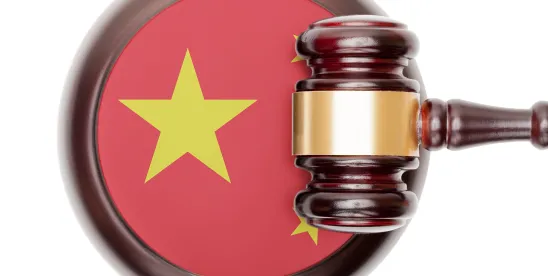On August 1, 2025, China’s Supreme People’s Court (SPC) released the Interpretation of the Supreme People’s Court on the Application of Law in the Trial of Labor Dispute Cases (II)(最高人民法院关于审理劳动争议案件适用法律问题的解释(二)). The Interpretation states that if an employee is not aware of or exposed to the employer’s trade secrets and confidential matters related to intellectual property, even if an employer and employee have agreed upon a non-compete clause, the non-compete clause will not take effect and will not be binding on the employee. If the employee falls within the scope of the non-compete clause, the scope, region, and duration of the non-compete clause should be commensurate with the trade secrets and confidential matters related to intellectual property that the employee is aware of or exposed to, and any excess will be invalid.

At a press conference announcing the release, the SPC explained,
Intellectual property (including trade secrets) has significant economic value. Under the socialist market economy, the survival and development of market entities are closely linked to competition for talent. The purpose of establishing a non-competition system is to prevent unhealthy competition. This system is a concrete manifestation of balancing the protection of employers’ business rights and employees’ right to choose their jobs. The Supreme People’s Court attaches great importance to resolving disputes arising from non-competition agreements. In formulating the “Interpretation II,” it adhered to the principle of both protecting employers’ competitive advantage and facilitating the free flow of talent. During employment, employers guarantee employees’ employment and livelihood rights through the payment of labor remuneration. Non-competition employees, based on their duty of loyalty to their employers, should bear the obligation to maintain non-competition agreements during their employment. Therefore, while the “Interpretation II” clearly states that “non-competition agreements” should not be abused, it also stipulates that non-competition clauses agreed upon between employers and non-competition employees in accordance with the law are legal and valid, and employers are not required to pay financial compensation for such violations. Because employees’ violation of non-competition agreements poses risks and losses to employers, to protect the employer’s competitive advantage, the “Interpretation II” stipulates that employees who violate non-competition agreements shall bear legal liability for breach of contract.
A translation of the relevant Article follows. The full text of the Interpretation is available here (Chinese only) from social media as the SPC’s website remains geoblocked.
Article 13 If an employee is not aware of or has access to the employer’s trade secrets and confidential matters related to intellectual property rights, and the employee requests that the non-competition clause be declared ineffective, the People’s Court shall support the request in accordance with the law.
If the scope, region, term, and other contents of the non-competition clause are inconsistent with the trade secrets and confidential matters related to intellectual property that the employee is aware of or exposed to, and the employee requests that the part of the non-competition clause that exceeds a reasonable proportion be declared invalid, the people’s court shall support it according to law.



 />i
/>i
